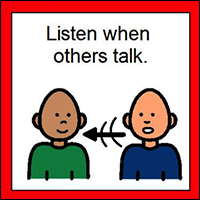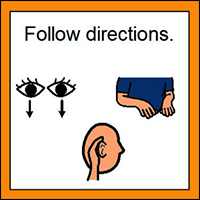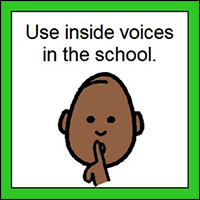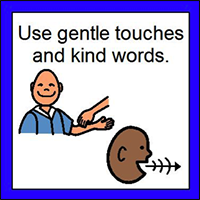How can teachers encourage and reinforce expected behaviors?
Page 8: Sharing Rules with Families
Once teachers have established classroom rules, they should communicate those rules to the families. One common way to do this is for the teacher to send home a letter informing families about the classroom rules. Click here to review an example of such a letter. By communicating and informing families of the rules, teachers can:
Example: Classroom Rules Letter
Date
Dear Families,
In our class, we have been working on learning the rules of our classroom! I want to share them with you so you know what we are working on and so you can talk with your child about the rules if you would like. Our rules are:





In our classroom, we focus on reinforcing children for following the rules and reminding them of the rules throughout the day and when they need extra help. We also encourage them to think about why the rules are important.
If you are interested in teaching household rules to your child, please let me know, and I will be happy to give you some information and support.
Please contact me if you have any questions!
Thank you,
(Close this panel)
- Inform families of the expected school behaviors
- Promote consistency between home and school
- Lay the foundation to establish positive relationships
Research Shows
Positive relationships between teachers and families helps create a supportive context, which allows teachers to address the challenging behaviors of children should they arise.
(Fettig & Ostrosky, 2011)
 Communicating and informing families about classroom rules can open an important dialogue about developmentally appropriate behavior expectations for young children and effective ways to encourage young children to follow the rules. This is an important step in establishing a mutual understanding between parents and teachers about the rules. Further, this dialogue allows opportunities to discuss similarities and differences between home and school rules. This allows teachers and families to be as consistent as possible and to work together to help children navigate the expectations of the different environments.
Communicating and informing families about classroom rules can open an important dialogue about developmentally appropriate behavior expectations for young children and effective ways to encourage young children to follow the rules. This is an important step in establishing a mutual understanding between parents and teachers about the rules. Further, this dialogue allows opportunities to discuss similarities and differences between home and school rules. This allows teachers and families to be as consistent as possible and to work together to help children navigate the expectations of the different environments.
Communication with families should occur regularly throughout the year. To foster positive relationships with families, teachers can share information about children’s successes, including how they follow the rules. Teachers can also invite families to class celebrations when the class has earned a reward, or encourage family members to acknowledge the children’s successful school behavior. When teachers have positive relationships with families, it can be easier to engage in discussions when children are having difficulty following the rules.
Mary Louise Hemmeter talks about the importance of communicating with families of young children about behavior expectations and classroom rules (time: 1:28).

Mary Louise Hemmeter, PhD
Nicholas Hobbs Chair
in Special Education and Human Development
Vanderbilt University
Transcript: Mary Louise Hemmeter, PhD
Often when we’re dealing with families around children with challenging behavior, we’re dealing with families when there’s a problem. It’s important to be proactive with families prior to there being a problem behavior. And when we begin to talk about rules and expectations and what our approach to discipline is in classrooms, it’s important that we talk to families about that as well. If an important expectation in the classroom is to be respectful, we want parents to talk to their children about what it means to be respectful at home. That way, when there is a problem, we’ve established with parents what our expectations are, and we can talk about the behavior as it relates to engaging or not engaging in that expectation. It’s also the case that we expect parents to just know these things, and we can’t expect them to just know what to do about them if we’re not proactive in helping them know what the expectations are and what some ways are that they can promote those expectations at home. Another thing that helps when we have expectations is to have families talk about what their expectations are for children at home and for us to talk about what expectations are at school and to help children understand that sometimes the expectations we have at school are different than the expectations that families have at home, to help them bridge the gap. Expectations are going to be different there.
For Your Information
Teachers can also encourage their children’s families to establish household rules. When helping families establish rules, teachers can discuss guidelines for creating and teaching them (e.g., five or fewer rules, rules should be positively stated), the importance of reviewing and practicing them, and the value of positive feedback instead of criticism or punishment.
Revisit Mrs. Rodriguez's Classroom
 Mrs. Rodriguez is so proud of the children’s progress in following the classroom rules. She sends a letter home detailing the rules and their new token system. Subsequently, she begins to receive comments from families about the new classroom rules, their children’s enthusiasm for the new tokens, and how their children are excited to go to school every day.
Mrs. Rodriguez is so proud of the children’s progress in following the classroom rules. She sends a letter home detailing the rules and their new token system. Subsequently, she begins to receive comments from families about the new classroom rules, their children’s enthusiasm for the new tokens, and how their children are excited to go to school every day.